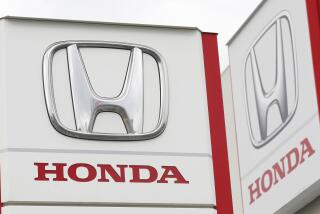9 Auto Makers Agree to Recall of 8.4 Million Cars
DETROIT â In the second-largest auto safety recall ever, seven Japanese and two U.S. auto makers agreed Tuesday to fix 8.4 million vehicles equipped with failure-prone seat belt buckles made by a Japanese parts supplier.
The voluntary recall requires the auto makers to replace or repair the red release button on the seat belts. The plastic button has a tendency to break, jamming the locking mechanism and possibly giving way during crashes.
âThe investigation showed, and the auto makersâ acknowledged, that buttons in these buckles have broken and others may break in the future,â Transportation Secretary Federico Pena said at a news conference in Washington.
The vehicles being recalled represent nearly 5% of all vehicles on the nationâs highways. The government initially estimated the repair costs at $1 billion, but industry officials said the bill is likely to be substantially less because, in most cases, the repair will involve installing a new part, not replacing the seat belt.
The recall comes as trade tensions between the United States and Japan have intensified dramatically in recent weeks, but industry officials and safety advocates said that the safety action was not tied to the trade issue.
The move comes only months after the National Highway Traffic Safety Administration was harshly criticized for withdrawing a recall of General Motorsâ Chevrolet pickup trucks equipped with sidesaddle gas tanks and dropping a defect probe of rear-door latches on Chrysler minivans.
âTrade is not an issue here but there was some feeling that NHTSA needed a clear victory after the GM and Chrylser situations,â said one Japanese corporate spokesman who asked not to be identified.
U.S. regulators said the agreement demonstrated the governmentâs increased effort to cooperate with business by reaching practical solutions that reduce costly litigation while getting safety problems fixed quickly.
âThis is a real victory for consumers,â said William Boehly, head of NHTSAâs office of safety assurance.
However, Clarence Ditlow, president of the Center for Auto Safety, a consumer advocacy group, criticized the remedy. While he praised the recall, he said anything short of a new buckle was inadequate.
âThe regulators seem to be protecting the manufacturing pocketbooks without fully protecting consumersâ safety,â he said.
The cost is likely to be shared by the auto makers and Takata Corp., the large Tokyo-based supplier of the seat belts. Takata controls about 20% of the U.S. seat belt market and about 30% of the world market.
The recall requires the nine auto makers to fix the front-seat buckles in 46 models produced between 1986 and 1991. The recall follows a nine-month investigation that began after Canadian regulators alerted their U.S. counterparts to a similar problem.
U.S. regulators uncovered 931 consumer complaints involving the seat belts. Ninety injuries, but no deaths, have been caused by the problem, they said.
All the seat belts were made in Japan and installed in vehicles exported to and assembled in the United States. Among the popular models included in the recall are the Honda Accord, Nissan Pathfinder and the Geo Metro made by General Motors.
The manufacturers who agreed to the voluntary action are Honda, Nissan, Chrysler, Mitsubishi, GM, Mazda, Suzuki, Subaru and Isuzu. Ford and Daihatsu were included in the probe but did not join the agreement.
Ford initially thought that more than 200,000 Festiva sedans had Takata belts, but later determined that was not true. Daihatsu no longer sells cars in the United States.
The biggest previous recall, U.S. regulators said, was in 1981 when Ford voluntarily warned owners of 21 million 1970-79 model cars and trucks that the automatic gear shift could move out of park and into reverse if improperly engaged.
Officials at Takata acknowledged that their seat belts have had problems, but indicated that they feel the issue is being blown out of proportion. âWe feel the incidence of complaints and failures are small,â said John Bailey, a spokesman for Takata Inc., the companyâs U.S. unit in Auburn Hills, Mich.
The company suspects that the plastic used in the release button was weakened by exposure to sunlight or extreme temperature swings. Company officials also say it is possible the part was improperly made because additives to strengthen it were not mixed properly.
The recall requires that the auto makers send first-class notification letters to owners offering to repair or replace the front buckles for free.
The auto makers are free to choose how to fix the defect within certain guidelines.
Brian OâNeill, president of the Insurance Institute for Highway Safety, an industry safety research group, said the negotiated settlement is the most expedient outcome for the consumer.
âWe believe you should not wait for a seat belt to fail,â he said. âWe believe it should get fixed right away.â
The recall comes just a two months after NHTSA agreed to drop a defect investigation of Chryslerâs minivan after the company agreed to replace the rear-door latch without admitting any safety defect. It also follows the agencyâs settlement with GM over the sidesaddle gas tanks. NHTSA issued an initial finding of defect, but reversed itself after GM agreed to donate $51 million toward to future safety programs.
* CONSUMER TIPS: How to handle the recall. D1.
* DEALERS GEAR UP: Repair boom expected. D2
* UNDER FIRE: Belt maker in spotlight. D2






